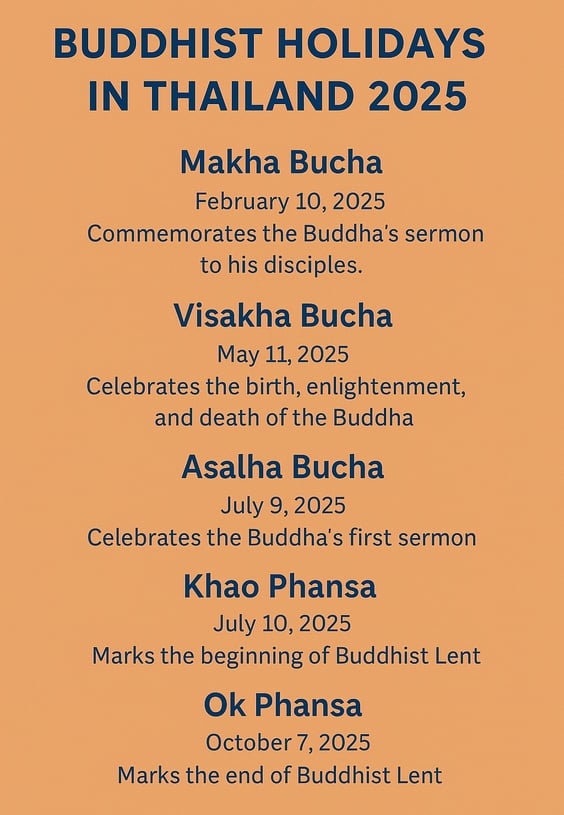Understanding Thai Culture and Customs in 2025: Dress Codes, Traditions, Public Holidays, and Local Travel Trends
Before You Travel to Thailand Before visiting Thailand, it is essential to understand key cultural norms. These include temple dress codes, local traditions, attitudes toward politics and religion, Buddhist public holidays, school vacations in 2025, and the most popular destinations for Thai locals.
BLOG THAILAND
5/28/20253 min read


Introduction: At the Heart of the Siam Kingdom
Traveling to Thailand in 2025 means immersing yourself in one of the most culturally rich nations in Southeast Asia. Formerly known as the Kingdom of Siam, Thailand fascinates with its spiritual foundations, tropical beauty, dreamlike beaches, and vibrant festivities. To fully appreciate Thai culture, it's crucial to respect local customs—especially in temples, during major celebrations, and in rural settings like northern national parks or fishing villages along the Gulf of Thailand and the Andaman Sea.
Temple Etiquette: Dress and Behavior
Buddhist temples (wats) are sacred places, and tourists in 2025 are still often unaware of basic etiquette. Here are the key rules:
Cover your shoulders and knees.
Remove your shoes before entering.
Never point your feet at Buddha statues.
Show respect to monks, and women should never touch them.
In Bangkok or Koh Samui, many temples display signs explaining these rules in multiple languages.
Cultural Restraint: Monarchy, Politics, and Religion
Thailand holds its monarchy in the highest regard. Criticism of the royal family is strictly prohibited and can result in prosecution. The same caution applies to political discussions, especially in sensitive areas like Bangkok. Thai people value discretion, politeness, and calm demeanor—whether on the beach, in a resort, or at a night market.
Must-Know Thai Festivals
Songkran – The Water Festival
April 13–15
Celebrating the Thai New Year, Songkran involves nationwide water fights, from Samui to southeastern villages. Spiritually, it’s a time for purification by gently pouring scented water on elders’ hands and Buddha statues.
Loy Krathong – Festival of Lights
November
Thais float krathongs (decorated rafts) on rivers to honor Nam, the water goddess. It’s a romantic and magical celebration marked by lanterns lighting the skies of Chiang Mai and peaceful coastal provinces.
Visakha Bucha
May 11, 2025
Honors the birth, enlightenment, and death of Buddha. Night processions with candles are held even in festive zones like Bangla Road in Phuket.
Elephant Festival
March
Held in cities like Surin, this festival celebrates Thailand's national animal with parades and fruit offerings.
Phi Ta Khon – Ghost Festival
June
In Ban Dan Sai, men wear scary masks and parade with music to scare away evil spirits.
Royal Holidays:
King Rama X's Birthday: July 28
Queen Mother’s Birthday / Mother’s Day: August 12
National Day: December 5
Thai School Holidays (2025)
Thailand’s school calendar differs from the Western system:
Summer Break: March to mid-May (expect crowds in Phuket and Samui)
Mid-Year Break: October
Additional holidays coincide with Buddhist festivals and royal observances.
Major Buddhist Public Holidays (2025)
Thailand is about 93–94% Buddhist, with major holidays tied to Theravāda Buddhism:
Makha Bucha (Feb 10): Commemorates Buddha’s sermon to 1,250 disciples.
Visakha Bucha (May 11): The most significant Buddhist holiday, marking Buddha’s birth, enlightenment, and death.
Asalha Bucha (July 9): Celebrates Buddha’s first sermon and the founding of the monastic community.
Khao Phansa (July 10): Marks the start of Buddhist Lent; monks retreat for meditation during the rainy season.
Ok Phansa (Oct 7): Ends the three-month monastic retreat, with processions and merit-making rituals.
Plan around these dates if you wish to avoid crowded parks, islands, or cultural sites.
Where Do Thai Locals Travel?
Contrary to popular belief, Thai people don’t spend all their time on beaches. Popular destinations include:
Northern Highlands: Chiang Rai, Pai, and Doi Inthanon National Park
Gulf of Thailand: Koh Samui remains popular for tranquil resorts
Family Activities: Snorkeling, cave visits, and Muay Thai classes
Culinary Tourism: Local dishes like green curry, tom yum, pho, and regional specialties are essential travel elements
Cultural Notes You Shouldn’t Miss
Never step on or crumple the baht (local currency)
Night markets offer exotic fruits, grilled insects, and spicy curries
Coastal villages still rely on traditional fishing and offer authentic off-the-beaten-path experiences
FAQ – Thai Culture, Customs, and Travel Tips
Do I need special clothing to enter a temple?
Yes: cover shoulders and knees; remove shoes; respect monks.
When should I avoid Thai beaches?
During the rainy season (May to October on the Andaman coast). The Gulf of Thailand (Koh Samui) is often drier.
Are elephants respected in Thailand?
Not everywhere. Choose ethical sanctuaries and avoid elephant rides.
Best time to visit Thailand?
November to February (dry season). Ideal for beach stays and outdoor exploration.
What is Thailand’s national airline?
Thai Airways is the national carrier for both domestic and international routes in Southeast Asia.
Can you enjoy beaches during rainy season?
Yes, but cautiously. Gulf islands like Koh Phangan, Koh Tao, and Hua Hin are often more sheltered.
Most beautiful beaches in Thailand?
Koh Phi Phi: turquoise waters, white sand, Maya Bay
Khao Lak: quiet resort area
Koh Phangan & Koh Tao: diving and snorkeling paradise
Koh Chang: wild, with beachfront bungalows
Which temples (wats) should I visit?
Bangkok: Wat Arun, Wat Phra Kaew, Wat Pho
Ayutthaya: ancient ruins of the Siamese kingdom
Krabi and islands: small jungle-clad Buddhist temples
Can I see monkeys or natural caves?
Yes. Notable spots include Pha Nang Cave Beach (Krabi) and Phang Nga Bay islands.
Best snorkeling spots?
Koh Tao (top-rated in Southeast Asia)
Krabi islands (e.g., Koh Hong)
Koh Phi Phi (reef and coral excursions)
Is there nightlife on Thai islands?
Yes. Pattaya, Koh Phangan, and Koh Phi Phi are known for bars, parties, and Full Moon events at Haad Rin.
Accommodation types on the islands?
From basic wooden bungalows to luxury tropical resorts. On Koh Chang, Koh Tao, or Koh Phi Phi, beachside stays are popular.
Daily budget on the islands?
Expect to spend around 1,500–2,500 baht per day ($40–$70 USD) for lodging, meals, transport, and excursions.
Travel
Asia Blog – Practical tips about Vietnam, Thailand, visas, eSIMs, banking, travel budget, and more.
© 2025. All rights reserved.
